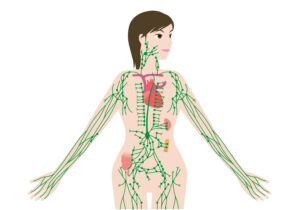
Lymphoedema, Breast Cancer and SOZO Body Composition Scanning
After treatment for breast cancer (or melanoma and some other cancers) you may be a risk of developing lymphoedema. This is due to removal of or damage to lymph nodes as part of the treatment you receive.
Lymph nodes are important drainage and immune nodes located in the lymphatic system, which drains and manages your fluid balance throughout your tissues. When they are removed or damaged, it can upset the lymphatic system’s capacity to balance fluid levels, which can lead to swelling, discomfort and pain in the affected regions.
Current evidence shows that using bioimpedance body scanning technology to measure fluid index (L-Dex) to monitor the development of lymphoedema symptoms can prevent up to 90% of breast-cancer related lymphoedema. This is because a SOZO scanner is so sensitive it can detect changes in your L-Dex levels before a region shows any swelling or fluid build up externally. It is critical to detect these “sub-clinical” changes so that early treatment can be prescribed (compression, massage, exercise, lifestyle modifications), because once lymphoedema is clinical (ie. can be seen, felt, measured externally) it is very difficult and often impossible to reverse, and it is never curable.
Anyone who has had cancer treatment for breast cancer, melanoma, gynaecological or prostate cancer is at risk. There are also other conditions that place people at risk of developing lymphoedema. For breast cancer patients the risk varies according to research but is possibly as high as 70% of patients. And of those who develop lymphoedema most develop it in the first 3 years after treatment, but the risk can last as long as 10 years.
Current recommendations for best practice include taking an L-Dex scan measurement before treatment (baseline measure) and then at three month intervals for the first 3 years after treatment, for early detection in the highest risk period.
Getting a SOZO Scan, and seeing a lymphoedema / oncology physiotherapist
Our physiotherapist Megan Howard is a specialist oncology and lymphoedema practitioner who can help you following the diagnosis of cancer – through the whole journey from diagnosis, to treatment, to recovery, including:
- SOZO Body scanning (L-Dex)
- Lymphoedema monitoring and surveillance
- Compression garment measuring and prescription
- Lymphoedema massage
- Exercise prescription and advice
- Musculoskeletal pain treatment
- Lifestyle advice
Please call the clinic to make an appointment to see Megan. Ph. (03) 9850 4437.




